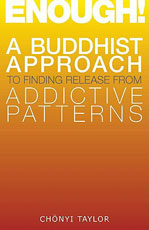Chonyi Taylor was ordained as a Buddhist nun by the Dalai Lama in 1995. She is currently a lecturer and supervisor in the Graduate Diploma Program in Buddhism and Psychotherapy for the Australian Association of Buddhist Counselors and Psychotherapists and is an honorary lecturer in Psychological Medicine at Sydney University. In this practical and edifying book, Taylor presents a cogent plan based on Buddhist teachings for undermining and removing addictions of all types.
Taylor sees addiction as primarily a state of mind, sustained through habit, hard to control, with the semblance of pleasure, and turning out to be harmful to us and others. Changing the compulsive mind involves three tools: mindfulness, introspection, and equanimity. The last practice helps us tolerate the ups and downs, the disappointments and the exhilarations of life. Taylor probes the healing powers of equanimity in terms of our feelings, the environment, and other people.
The author does a fine job assessing the pernicious nature of triggers to addiction and the roadblocks of exaggeration, denial, and pain. Change is not an easy or swift process when it comes to turning our lives around. But it can be done. Taylor concludes with some gold nuggets learned by wise people, some comments on the freedom that is connected to liberation from the isolation of addiction, and 16 guidelines for a happy life.
